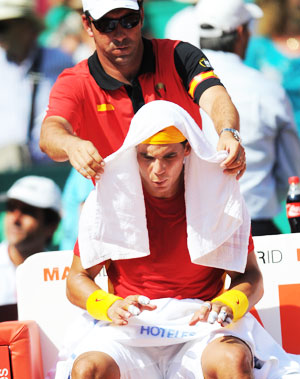Nadal can’t complain about tennis schedule
Less than a week after losing the U.S. Open final, Rafael Nadal took the courts for Spain in the Davis Cup. (Jasper Juinen/Getty Images)
Rafael Nadal is exhausted. The mind is wiling but the body is not, and for that he blames the overcrowded tennis schedule. This isn't the first time Rafa has complained about the schedule. It's been an ongoing concern for years.
So perhaps buoyed by his activist stint at the U.S. Open -- where several top men took to the microphone to express their displeasure with the perceived lack of sympathy and understanding from Tour and tournament officials regarding the health and well-being of the players -- Nadal is back at it again. Except this time, noting that while he doesn't want to see a players' strike, he does think strong action is necessary to fix a broken schedule.
"We don't want to get there," Nadal said, referring to a players' strike. "We want to play. But if it's a fight about something that we think is fair, something would have to happen. Sometimes the only way to make things happen is to choose strong action."
It's always painful to see players struck down by injury or plagued by fatigue. No one wants that. Tennis only works as an elite sport if the competitors are able to perform at their highest level at any tournament. If the players are constantly battling their bodies, it takes away from the competition and it diminishes the results. How many times have you been in a debate and found yourself saying, "Yeah, but Nadal wasn't fit during that match." Or, "Yeah, but Roddick was just coming back from injury." Or, "Sure, but Soderling's been nursing that foot injury," and so on and so on. If the players aren't able to play at their best, then does every result have an asterisk next to it? That would be a pain.
So one part of me is highly sympathetic to the players. It's not in anybody's interest to have them overworked and exhausted. The other part of me heard screeching tires when I read Nadal's complaints. Here are some reasons why:
Wait, wasn't this your idea?
While the ITF's scheduling of the Davis Cup quarterfinals and semifinals for the week immediately following Wimbledon and the U.S. Open, respectively, seems abundantly cruel, it's that way because Nadal wanted it that way. These Davis Cup ties used to be scheduled two weeks after the Slams, but in October 2006, Nadal, along with 17 of the top 20 players, including Roger Federer and Andy Roddick, requested that the ITF move the ties up a week. The ITF acquiesced and the change was applied at the start of the 2009 season. Given his hand in setting the current schedule, Nadal's carping rings a bit hollow.
You are your own boss.
The top 30 players are required to play all four Slams, eight of the nine Masters 1000 events (Monte Carlo is optional) and four of the 11 ATP 500 events. Outside of that, it's all in the player's hands. Nadal has played 14 tournaments so far and two rounds of Davis Cup on top of that. Federer has played 13 tournaments and two rounds of Davis Cup, and Djokovic has played 12 tournaments (13 if you include Hopman Cup). All that is to say Nadal has played more than the other top guys and that's his choice. He doesn't have to. He didn't have to play Barcelona, Monte Carlo, Davis Cup or Queens, for example. I obviously understand the reasons why he did (warm-up, points, appearance fees, pride, history), but the fact remains he didn't have to. If you are as tired as you claim to be, then you need to manage your schedule better.
Don't play exhibitions.
I'm all for players doing whatever they want. I just take issue when they do whatever they want and then complain about the consequences. I don't feel bad for you if you eat four pounds of chocolate and then get a tummy ache. You probably shouldn't have eaten that much chocolate in the first place.
So, again, there isn't a problem with players playing exhibitions if they want. Exhibition events provide exposure for the game and usually raise funds for charity, and the players pocket a little (or not so little) bit of cash for their efforts. But, Rafa, you flew from playing the final in Indian Wells on a Sunday to Colombia to play a South American exhibition with Djokovic the next day, and then flew back to the States to play Miami the following week. You can't tell me you had to do that. And you can't tell me that spending those four days resting instead of traveling between continents wouldn't have done your body good at the time.
*****
There will always be critiques of the never-ending tennis schedule. There are just too many disparate interests pushing and pulling against each other. Top-ranked players want a light schedule because they're the ones doing the heavy lifting; lower-ranked players want a long, packed schedule because they need prize money. The ATP wants to sell the rights to as many tournaments as possible; and tournament directors want a return on their investment, and thus need the top players to show up to sell tickets.
There are solutions that would seem to appease all involved if everyone was willing to give a little. Fewer mandatory events would provide more flexibility to the top guys, a two-year ranking system would take the pressure off constantly having to defend points, and shortening the season by a week or two must be feasible. Do the players really need an empty week between Paris and the World Tour Finals? But, again, to get all the players on the same page seems nearly impossible. Cut a month off the schedule and you're talking about millions of dollars lost from all sides.






